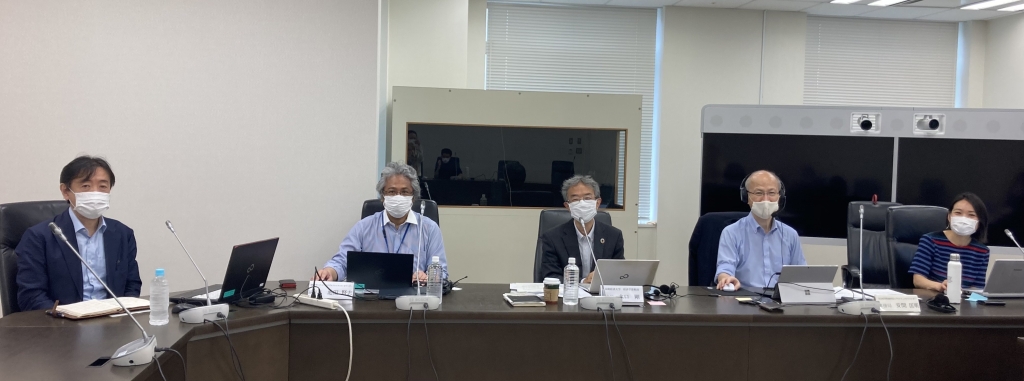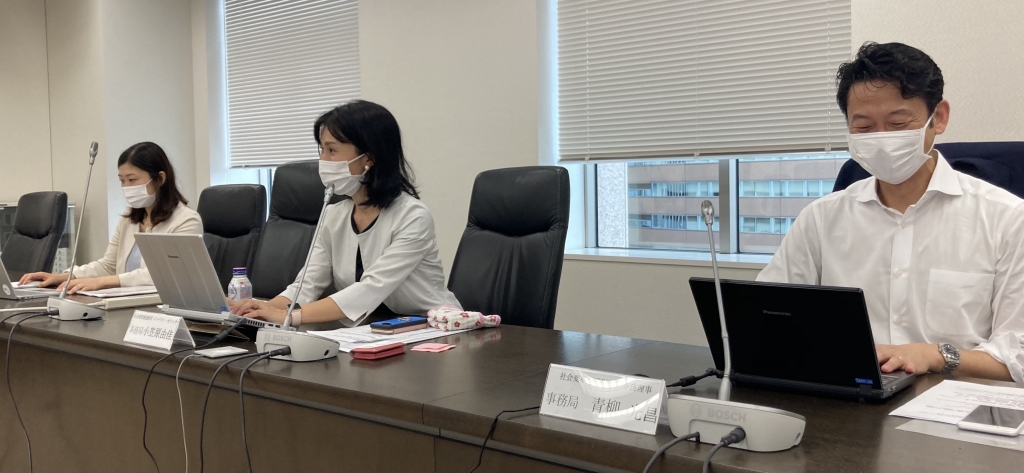News
News
The 6th meeting of the "Impact Investing Roundtable" was held online on Tuesday, June 29, to deepen the understanding of impact investing among the leaders involved in the financial market and government administrations, and to discuss the significance and challenges of addressing social issues through impact investing in Japan and abroad.
The 6th meeting focused on impact investing through loans and community finance. Upon sharing case studies, the following topics were discussed among participants: the characteristics of impact investing that are unique to loans and community finance; the difficulties of IMM of debt finance; the differences between IMM in debt and equity investment; the role of local financial institutions in solving local issues and achieving sustainable growth of local economies; and the role of financial institutions to promote co-creation with local communities.
At the beginning of the session, Dr. Takeshi Mizuguchi, the Chairman of the Roundtable and the President of Takasaki City University of Economics, and Mr. Satoshi Ikeda, the Vice Chairman of the Roundtable and the Chief Sustainable Finance Officer of Financial Services Agency (FSA) of Japan, gave opening remarks. They pointed out the importance of loan finance, the theme of this roundtable session, as well as the fact that loan financing is an extremely important tool considering the overall flow of funds in Japan. They also referred to the report recently published by the FSA's "Expert Panel on Sustainable Finance", which mentioned the importance of impact finance and the recommendations for this “Impact Investing Roundtable" to have continuous discussions.
Next, Ms. Yuka Ogasawara, Impact Officer of Japan Social Innovation and Investment Foundation (SIIF), briefly presented the case study of Calvert Impact Capital, based on the video interview that was shared to participants in advance to the meeting. They issue Community Investment Note and provide funds to impact oriented financial intermediaries. Their IMM practices are based on three axes: 1) impact on investors, 2) impact on borrowers, and 3) impact on the community, and they are implementing advanced approaches such as quarterly impact monitoring and impact management using scorecards.
Next, four speakers, Mr. Minoru Hayashida, Senior Manager, Technology Based Finance Team, Sustainability Management Department, Sumitomo Mitsui Trust Bank (SMTB), Limited, Mr. Kenichi Shinozaki, Director, Planning and Community Engagement, Dai-Ichi Kangyo Credit Cooperative, Mr. Tatsuya Suzuki, General Manager, CORPORATE FINANCE ADVISORY GROUP, The Shizuoka Bank, Ltd. and Mr. Tomoharu Kusaka, Director of the Better Regional Finance Office, FSA, gave presentations.
Mr. Hayashida of SMTB introduced the UNEP Financial Initiative's (FI) Principles for Responsible Banking (PRB) and the Principles for Positive Impact Finance as the background to the bank's efforts in implementing positive impact finance (PIF). He explained that the core idea of these initiatives is to be impact-oriented to contribute to the achievement of the SDGs. He also introduced SMTB’s activities to incorporate impact into the core of their Medium-Term Management Plan, and also introduced their framework for enhancing corporate value creation and for building a sustainable society. He also shared their impact management processes, including goal setting and monitoring.
Next, Mr. Shinozaki of Dai-Ichi Kangyo Credit Cooperative explained the differences and characteristics between banks and cooperative financial institutions, and explained that the core of Dai-Ichi Kangyo Credit Cooperative 's management philosophy is the prosperity of the local economy and the happiness of local people. He then introduced their products such as community loans, start-up loans, and social business support loans, and shared the current issues such as the difficulty in measuring the impact and incorporating them into the loan screening criteria.
Next, Mr. Suzuki of Shizuoka Bank introduced how the bank is implementing PIF using UNEP-FI tools in collaboration with an external third-party evaluation organization. He also introduced the specific check points in the loan evaluation process and the contents of the interview sheets with borrowers. He pointed out that there are many benefits for clients, such as improving employee awareness and organizational development to enhance ESG/SDGs, and that qualitative business assessment is an area where regional financial institutions can make the most of their characteristics.
Mr. Kusaka of Financial Services Agency (FSA) then introduced the FSA's efforts to help solve regional issues and challenges. He introduced the changes in financial administration and the reform of the FSA, as well as the contents and results of specific projects. As for the latest updates, he also shared about the launch of a "platform for sharing business support know-how" exclusively for financial institutions with the aim of revitalizing companies affected by the Covid-19 pandemics, and the launch of the "Collaborative Team for Revitalizing Sustainable Local Economies and Societies", a collaboration between the FSA and the Ministry of the Environment.
After the presentations by the four speakers, a panel discussion was held under the facilitation of Dr. Mizuguchi, with Mr. Tsukasa Kanai, Chief Sustainability Officer of Sumitomo Mitsui Trust Bank, Mr. Kenichi Shinozaki of Dai-Ichi Kangyo Credit Cooperative, Mr. Masatsugu Ikeda, General Manager of SOLUTION BUSINESS DEPARTMENT of The Shizuoka Bank, and Mr. Tomoharu Kusaka of Financial Services Agency.
In the discussion on how regional financial institutions can revitalize their communities and society, it was argued that the ultimate role of regional banks is to promote regional revitalization, and that it is important for them to contribute to revitalizing local economies by addressing issues such as business succession faced by small and medium-sized enterprises (SMEs) and boosting local economies despite declining population. It was also pointed out that although the scopes of megabanks, which are looking at global environmental and social issues, and regional financial institutions, which are looking at the issues of local communities, are different, their basic approach to impact is the same. Even when providing loans to large corporations, it is important to take a local societal perspective, and the impact on the local economic ecosystem must be taken into account. In this context, it was argued that cooperation between megabanks and regional financial institutions will become more important in the future.
In the discussion on the development of the debt financing, it was pointed out that financial institutions are no longer just providing funds, and that it is important to consider how much added value they can provide to their customers, and that the PIF is one form of this and will lead to a change in the business model of regional financial institutions. Regarding the engagement, it was suggested that both portfolio-based impact management and impact management of individual customers should be promoted.
In the discussion on what is needed to expand impact finance, the view was expressed that the role of financial institutions should be to take the leadership in creating impact for the planet and communities, and that financial institutions will be required to change their own business models to become more impact-oriented.
The panel discussion was followed by a breakout session, in which the participants were divided into several groups to discuss “what is important for the IMM in impact investment through debt financing, with a focus on medium and large sized companies” and “how regional financial institutions can promote impact investment through loans from the perspective of solving economic and social issues of local communities in the context of regional revitalization”.
For the former question, it was pointed out that it is necessary for companies to transform their business models to become more impact-oriented, and it is important to visualize this through impact assessment. In the case of loans, since a wider range of companies are covered than in the case of equity investment, there is concern that all loans may be regarded as positive impact for reasons of employment and tax payments. For large companies, it is necessary to consider impact across the entire group and supply chain, therefore a holistic perspective is needed. As for the latter question, it was pointed out that local economies are becoming more susceptible to the effects of major waves of the global economy. In this contest, support for local economies is becoming more important, and that cooperation between local governments and financial institutions will become even more important in the future.
The meeting was attended by 31 Roundtable members from the financial market, business, and industry sectors, and about 100 observers participated including related ministries and others.
The next meeting is scheduled to be held on September 3, 2021.


- News
- GSG-NAB Japan and Financial Services Agency of Japan co-hosted the 6th "Impact Investing Roundtable " on June 29.

